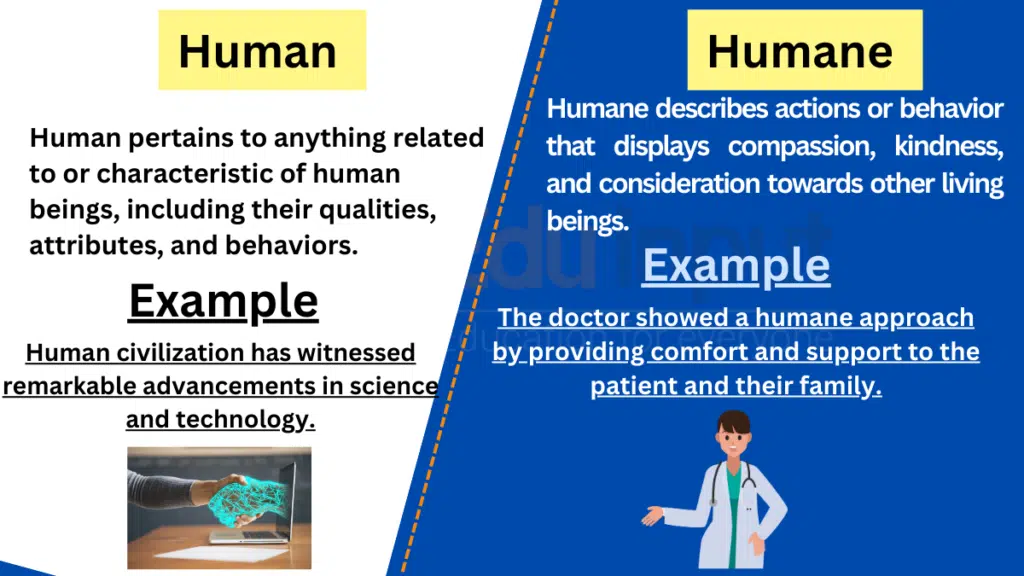Human vs. Humane-Difference between and examples
In the vast expanse of the English language, certain words may appear similar but carry distinct meanings, leading to confusion and misinterpretation. “Human” and “humane” are two such words that often cause uncertainty among language learners. This article will explore the differences between “human” and “humane,” unraveling their definitions, usage, and contextual nuances. By grasping the disparities between these words, we can enhance our language skills and communicate more effectively. Join us as we embark on this linguistic journey to uncover the contrasting meanings of “human” and “humane.”

Meanings and Examples
Human meaning
Human pertains to anything related to or characteristic of human beings, including their qualities, attributes, and behaviors.
Human Examples
a) The human brain is an incredibly complex organ, capable of intricate thought processes.
b) We should treat each other with kindness and respect, embracing our shared human experience.
c) Human civilization has witnessed remarkable advancements in science and technology.
Humane meaning
Humane describes actions or behavior that displays compassion, kindness, and consideration towards other living beings.
Humane Examples
a) Rescue organizations work tirelessly to provide humane treatment and care for abandoned animals.
b) The doctor showed a humane approach by providing comfort and support to the patient and their family.
c) Prison reform aims to create more humane conditions for inmates, focusing on rehabilitation rather than punishment.
Difference between Human and Humane
| Human | Humane | |
| Meaning | Related to or characteristic of human beings | Displaying compassion and kindness towards other living beings |
| Example | “The human brain is an incredibly complex organ.” | “Rescue organizations provide humane treatment for animals.” |
| Usage | Describing attributes, behaviors, and qualities of humans | Referring to compassionate and considerate actions or behavior |
| Context | Human nature, society, characteristics | Compassion, kindness, and consideration toward living beings |
Usage in a Paragraph
Imagine a scenario where a group of individuals is volunteering at a homeless shelter. Their aim is to provide assistance and support to those in need. As they interact with homeless individuals, they demonstrate their understanding of the shared human experience, treating each person with dignity, respect, and empathy. Their actions reflect the essence of being human, emphasizing the importance of compassion and connection within the broader human community.
In another context, picture a veterinary clinic where injured or abandoned animals are brought for care. The staff at the clinic shows a humane approach by providing medical treatment, shelter, and love to the animals. They prioritize the well-being and welfare of these living beings, showcasing compassion and kindness in their actions. Their efforts highlight the significance of treating all creatures with empathy and consideration.
By distinguishing between “human” and “humane,” we can utilize these words more accurately to convey our thoughts and ideas. “Human” encompasses anything related to or characteristic of human beings, whereas “humane” emphasizes actions and behavior that display compassion and kindness towards all living beings. By employing these terms correctly, we can acknowledge the qualities and attributes of humanity and promote a more compassionate and considerate approach toward others. Let us embrace our shared human experience and cultivate a more humane world by extending kindness, empathy, and understanding to all.






Leave a Reply